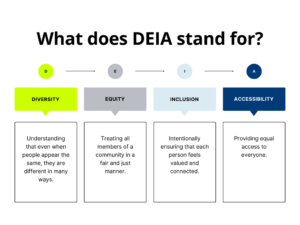How to Create A Sense of Belonging In The Workplace [& The Power It Can Have]
Imagine the power of a team and a world where everyone feels like they truly belong – a world where diversity is celebrated, inclusivity is cherished, and acceptance is the norm. In such a place, the concept of belonging takes center stage, bringing about remarkable transformations.
Several years ago while volunteering at a company booth at a local Pride celebration, a team member dropped by and expressed her surprise that the company was participating at a Pride event. When questioned why, she explained how she kept a store-bought photo of a man on her desk that she told everyone was her husband. She further went on to say that she felt the people she worked with would isolate her if they found out she was married to a woman. Imagine how much mental energy this woman had to expend every day on hiding her true self – energy that she could have devoted to her work and the outcomes of the team. Why is belonging important in the workplace? Belonging is an essential piece of a truly inclusive culture. When people feel seen and heard for who they truly are, they are more likely to engage fully, bringing their authentic selves and contributing to the collective growth and success of the team.
Why Is Belonging Important In The Workplace?
Belonging is closely intertwined with mental health and well-being.
When individuals feel a genuine sense of belonging, they experience greater psychological safety, self-esteem, and overall life satisfaction. In a truly accepting culture, where everyone feels valued and accepted, people are less likely to experience isolation, discrimination, or exclusion. This sense of belonging contributes to reduced stress, improved mental health, and an increased ability to navigate challenges. It lays the foundation for individuals to thrive and reach their full potential.
Belonging ignites innovation and creativity.
When diverse perspectives are embraced and individuals feel like they belong, it creates an environment where collaboration and the exchange of ideas flourish. By bringing together people from different backgrounds, experiences, and expertise, we generate a tapestry of insights and possibilities. This diversity of thought leads to breakthroughs, unconventional solutions, and fresh approaches that push the boundaries of innovation.
Belonging is the glue that holds communities together.
It is a place where everyone feels they belong, and the workplace and communities become stronger, more cohesive, and more resilient. When people feel a deep connection and sense of ownership, they are more likely to actively participate, contribute, and invest in the well-being of their teams and communities. This engagement fosters social cohesion, reduces divisions, and promotes collective action, ultimately creating a more inclusive and harmonious society.
7 Steps to Build a Diversity, Equity, Inclusion, and Accessibility (DEIA) Culture
Building a strong diversity, equity, inclusion, and accessibility (DEIA) culture requires a comprehensive and ongoing commitment. Here are some key steps that companies can take to build a strong DEIA culture.
- Establish goals and values that emphasize the importance of DEIA.
- Leadership commitment is essential. Executives and leaders must actively champion efforts and lead by example. Leaders should also be accountable for the progress and outcomes of DEIA initiatives.
- Diverse and Inclusive Hiring Practices: Implement practices to ensure a diverse candidate pool, utilizing diverse social channels and implementing blind resume screening, and providing unconscious bias training for all recruiting and hiring managers.
- Education: Offer DEIA training and educational programs for team members at all levels to create awareness, foster understanding, and build inclusive behaviors. Training can cover topics such as unconscious bias, cultural competency, inclusive communication, and allyship, creating a shared understanding of DEIA principles throughout the organization.
- Diverse Representation and Employee Resource Groups: Actively work towards diverse representation at all levels of the organization. Employee Resource Groups (ERGs) can be established to provide support, networking opportunities, and advocacy for underrepresented groups.
- Inclusive Policies and Practices: Review and revise policies and practices to ensure they are inclusive and equitable. This includes evaluating compensation and benefit structures, promoting work-life balance, and implementing flexible work arrangements that accommodate diverse needs.
- Metrics: Conduct assessments of DEIA efforts and track relevant metrics to measure progress and identify areas for improvement. Data such as diversity representation, parity pay audits, retention rates, employee satisfaction, and advancement opportunities should be collected to inform decision-making and accountability.
Belonging enriches the lives of individuals and creates transformative change. By celebrating uniqueness, fostering empathy, nurturing well-being, driving innovation, and strengthening communities, we can create spaces where everyone feels valued, respected, and empowered. As we strive for a more equitable and inclusive future, let’s embrace the power of belonging and work together to build a society that embraces and celebrates the diversity of all its members.
Amplēo Can Help
Not all companies have the tools, resources, or talent to devote to building a strong base to ensure successful DEIA efforts. This is where fractional executive talent can be a powerful resource to know how to create a sense of belonging in the workplace and help companies build strong DEIA programs. Amplēo fractional CHROs are ready to partner with you to provide the executive talent you need to build a workforce that will out-perform, out-innovate and out-produce all others.

